- Home
- Robert E. Howard
El Borak and Other Desert Adventures Page 6
El Borak and Other Desert Adventures Read online
Page 6
Gordon, crouching among the stones, glared at the gaunt giants rushing toward him until he could make out the fanatical blaze of their eyes, then he roared: “Fire!”
A thunderous volley ripped out along the wall, ragged, but terrible at that range. A storm of lead blasted the oncoming line, and men went down in windrows. And lost to all caution, the Attalans leaped the wall and hewed into the staggering Afghans with naked steel. Cursing as Hunyadi had cursed, Gordon drew his scimitar and followed them.
No time for orders now; no formation, no strategy; Attalan and Afghan, they fought as men fought a thousand years ago, without order or plan, massed in a straining, grunting, hacking mob, where naked blades flickered like lightning. Yard-long Khyber knives clanged and ground against the curved swords of the Attalans. The rending of flesh and bone beneath the chopping blades was like the sound of butchers’ cleavers. The dying dragged down the living and the warriors stumbled among the mangled corpses. It was a shambles where no quarter was asked and none given, and the feuds and hates of a thousand years glutted in slaughter.
No shots were fired in that deadly crush, but about the edges of the battle circled Hunyadi and the Turks, shooting with deadly accuracy. Man to man, the stalwart Attalans were a match for the hairy hillmen, and they slightly outnumbered the invaders. But they had thrown away the advantage of their position, and the rifles of the Hungarian’s party were dealing havoc in their disordered ranks, though two of the Ottomans were down, one hit by a matchlock ball in that first and only volley, and another disembowelled by a dying Attalan.
As Gordon hewed his way through the straining knots and flailing blades, he met one of the remaining Turks face to face. The man thrust a rifle muzzle in his face, but the hammer fell with a click on an empty shell, and the next instant Gordon’s scimitar ripped through his belly and stood out a foot behind his back. As the American twisted his blade free, the other Ottoman fired a pistol, missed, and hurled the empty weapon fruitlessly, and rushed in slashing with a saber at Gordon’s head. El Borak parried the singing blade, and his scimitar cut the air like a blue beam, splitting the Turk’s skull to the chin.
Then he saw Hunyadi. The Hungarian was groping in his belt, and Gordon knew he was out of ammunition.
“We’ve tried hot lead, Gustav,” challenged Gordon, “and we both still live. Come and try cold steel!”
With a wild laugh the Hungarian ripped out his blade in a bright shimmer of steel that caught the morning sun. He was a tall man, Gustav Hunyadi, black sheep son of a noble Magyar house, supple and lithe as a catamount, with dancing, reckless eyes and lips that curved in a smile as cruel as a striking sword.
“I match my life against a little package of papers, El Borak!” the Hungarian laughed as the blades met.
On each side the fighting lulled and ceased, as the warriors drew back with heaving chests and dripping swords, to watch their leaders settle the score.
The curved blades sparkled in the sunlight, ground together, leaped apart, licked in and out like living things.
Well for El Borak then that his wrist was a solid mass of steel cords, that his eye was quicker and surer than a falcon’s, and his brain and thews bound together with a coordination keen as razor-edged steel. For into his play Hunyadi brought all the skill of a race of swordsmen, all the craft taught by masters of the blade of Europe and of Asia, and all the savage cunning he had learned in wild battles on the edges of the world.
He was taller, had the longer reach. Again and again his blade whispered at Gordon’s throat. Once it touched his arm, and a trickle of crimson began. There was no sound except the rasp of feet on the sward, the rapid whisper of the blades, the deep panting of the men. Gordon was the harder pressed. That terrible fight with Ptolemy was taking its toll. His legs trembled, his sight kept blurring. As if through a mist he saw the triumphant smile growing on the thin lips of the Magyar.
And a wild surge of desperation rose in Gordon’s soul, nerving him for a last rush. It came with the unexpected fury of a dying wolf, with a flaming fan of steel, a whirlwind of blades — and then Hunyadi was down, clutching at the earth with twitching hands, Gordon’s narrow curved blade through him.
The Hungarian rolled his glazing eyes up at his conqueror, and his lips distorted in a ghastly smile. “To the mistress of all true adventurers!” he whispered, choking on his own blood. “To Lady Death!”
He sank back and lay still, his pallid face turned to the sky, blood oozing from his lips.
The Afghans began slinking furtively away, their morale broken, like a pack of wolves whose leader is down. Suddenly, as if waking from a dream, the Attalans gave tongue and pelted after them. The invaders broke and fled, while the infuriated Attalans followed, stabbing and hacking at their backs, down the valley and out through the pass.
Gordon was aware that Bardylis, blood-stained but exultant, was beside him, supporting his trembling frame that seemed on the point of collapse. The American wiped the bloody sweat from his eyes, and touched the packet under his girdle. Many men had died for that; but many more would have died had it not been saved, and helpless women and children.
Bardylis muttered apprehensively, and Gordon looked up to see a gigantic figure approaching leisurely from the direction of the city, through whose gate the rejoicing women were already streaming. It was Ptolemy, his features grotesquely swollen and blackened from Gordon’s iron fists. He strode serenely through the heaps of corpses, and reached the spot where the companions stood.
Bardylis gripped his notched sword, and Ptolemy, seeing the gesture, grinned with his pulped lips. He was holding something behind him.
“I do not come in anger, El Borak,” he said calmly. “A man who can fight as you have fought is neither wizard, thief nor murderer. I am no child to hate a man who has bested me in fair fight — and then saved my kingdom while I lay senseless. Will you take my hand?”
Gordon grasped it with an honest surge of friendship toward this giant, whose only fault, after all, was his vanity.
“I did not recover my senses in time for the battle,” said Ptolemy. “I only saw the last of it. But if I did not reach the field in time to smite the Moslem dogs, I have at least rid the valley of one rat I found hiding in the palace.” He casually tossed something at Gordon’s feet. The severed head of Abdullah, the features frozen in a grin of horror, stared up at the American.
“Will you live in Attalus and be my brother, as well as the brother of Bardylis?” asked Ptolemy, with a glance down the valley, toward the pass through which the warriors were harrying the howling Afghans.
“I thank you, king,” said Gordon, “but I must go to my own people, and it is still a long road to travel. When I have rested for a few days, I must be gone. A little food to carry with me on my journey is all I ask from the people of Attalus, who are men as brave and valiant as their royal ancestors.”
The Daughter of Erlik Khan
I
The tall Englishman, Pembroke, was scratching lines on the earth with his hunting knife, talking in a jerky tone that indicated suppressed excitement: “I tell you, Ormond, that peak to the west is the one we were to look for. Here, I’ve marked a map in the dirt. This mark here represents our camp, and this one is the peak. We’ve marched north far enough. At this spot we should turn westward —”
“Shut up!” muttered Ormond. “Rub out that map. Here comes Gordon.” Pembroke obliterated the faint lines with a quick sweep of his open hand, and as he scrambled up he managed to shuffle his feet across the spot. He and Ormond were laughing and talking easily as the third man of the expedition came up.
Gordon was shorter than his companions, but his physique did not suffer by comparison with either the rangy Pembroke or the more closely knit Ormond. He was one of those rare individuals at once lithe and compact. His strength did not give the impression of being locked up within himself as is the case with so many strong men. He moved with a flowing ease that advertised power more subtly than does mere beefy bulk.
Though he was clad much like the two Englishmen except for an Arab headdress, he fitted into the scene as they did not. He, an American, seemed almost as much a part of these rugged uplands as the wild nomads which pasture their sheep along the slopes of the Hindu Kush. There was a certitude in his level gaze, an economy of motion in his movements, that reflected kinship with the wilderness.
“Pembroke and I were discussing that peak, Gordon,” said Ormond, indicating the mountain under discussion, which reared a snow cap in the clear afternoon sky beyond a range of blue hills, hazy with distance. “We were wondering if it had a name.”
“Everything in these hills has a name,” Gordon answered. “Some of them don’t appear on the maps, though. That peak is called Mount Erlik Khan. Less than a dozen white men have seen it.”
“Never heard of it,” was Pembroke’s comment. “If we weren’t in such a hurry to find poor old Reynolds, it might be fun having a closer look at it, what?”
“If getting your belly ripped open can be called fun,” returned Gordon. “Erlik Khan’s in Black Kirghiz country.”
“Kirghiz? Heathens and devil worshipers? Sacred city of Yolgan and all that rot.”
“No rot about the devil worship,” Gordon returned. “We’re almost on the borders of their country now. This is a sort of no man’s land here, squabbled over by the Kirghiz and Moslem nomads from farther east. We’ve been lucky not to have met any of the former. They’re an isolated branch off the main stalk which centers about Issik-kul, and they hate white men like poison.
“This is the closest point we approach their country. From now on, as we travel north, we’ll be swinging away from it. In another week, at most, we ought to be in the territory of the Uzbek tribe who you think captured your friend.”
“I hope the old boy is still alive,” Pembroke sighed.
“When you engaged me at Peshawar I told you I feared it was a futile quest,” said Gordon. “If that tribe did capture your friend, the chances are all against his being still alive. I’m just warning you, so you won’t be too disappointed if we don’t find him.”
“We appreciate that, old man,” returned Ormond. “We knew no one but you could get us there with our heads still on our bally shoulders.”
“We’re not there yet,” remarked Gordon cryptically, shifting his rifle under his arm. “I saw hangul sign before we went into camp, and I’m going to see if I can bag one. I may not be back before dark.”
“Going afoot?” inquired Pembroke.
“Yes; if I get one I’ll bring back a haunch for supper.”
And with no further comment Gordon strode off down the rolling slope, while the other men stared silently after him.
He seemed to melt rather than stride into the broad copse at the foot of the slope. The men turned, still unspeaking, and glanced at the servants going about their duties in the camp — four stolid Pathans and a slender Punjabi Moslem who was Gordon’s personal servant.
The camp with its faded tents and tethered horses was the one spot of sentient life in a scene so vast and broodingly silent that it was almost daunting. To the south stretched an unbroken rampart of hills climbing up to snowy peaks. Far to the north rose another more broken range.
Between those barriers lay a great expanse of rolling table-land, broken by solitary peaks and lesser hill ranges, and dotted thickly with copses of ash, birch, and larch. Now, in the beginning of the short summer, the slopes were covered with tall lush grass. But here no herds were watched by turbaned nomads, and that giant peak far to the southwest seemed somehow aware of that fact. It brooded like a somber sentinel of the unknown.
“Come into my tent!”
Pembroke turned away quickly, motioning Ormond to follow. Neither of them noticed the burning intensity with which the Punjabi Ahmed stared after them. In the tent, the men sitting facing each other across a small folding table, Pembroke took pencil and paper and began tracing a duplicate of the map he had scratched in the dirt.
“‘Reynolds’ has served his purpose, and so has Gordon,” he said. “It was a big risk bringing him, but he was the only man who could get us safely through Afghanistan. The weight that American carries with the Mohammedans is amazing. But it doesn’t carry with the Kirghiz, and beyond this point we don’t need him.
“That’s the peak the Tajik described, right enough, and he gave it the same name Gordon called it. Using it as a guide, we can’t miss Yolgan. We head due west, bearing a little to the north of Mount Erlik Khan. We don’t need Gordon’s guidance from now on, and we won’t need him going back, because we’re returning by the way of Kashmir, and we’ll have a better safe-conduct even than he. Question now is, how are we going to get rid of him?”
“That’s easy,” snapped Ormond; he was the harder-framed, the more decisive, of the two. “We’ll simply pick a quarrel with him and refuse to continue in his company. He’ll tell us to go to the devil, take his confounded Punjabi, and head back for Kabul — or maybe some other wilderness. He spends most of his time wandering around through countries that are taboo to most white men.”
“Good enough!” approved Pembroke. “We don’t want to fight him. He’s too infernally quick with a gun. The Afghans call him ‘El Borak,’ the Swift. I had something of the sort in mind when I cooked up an excuse to halt here in the middle of the afternoon. I recognized that peak, you see. We’ll let him think we’re going on to the Uzbeks alone, because, naturally, we don’t want him to know we’re going to Yolgan —”
“What’s that?” snapped Ormond suddenly, his hand closing on his pistol butt.
In that instant, when his eyes narrowed and his nostrils expanded, he looked almost like another man, as if suspicion disclosed his true — and sinister — nature.
“Go on talking,” he muttered. “Somebody’s listening outside the tent.”
Pembroke obeyed, and Ormond, noiselessly pushing back his camp chair, plunged suddenly out of the tent and fell on someone with a snarl of gratification. An instant later he reentered, dragging the Punjabi, Ahmed, with him. The slender Indian writhed vainly in the Englishman’s iron grip.
“This rat was eavesdropping,” Ormond snarled.
“Now he’ll spill everything to Gordon and there’ll be a fight, sure!” The prospect seemed to agitate Pembroke considerably. “What’ll we do now? What are you going to do?”
Ormond laughed savagely. “I haven’t come this far to risk getting a bullet in my guts and losing everything. I’ve killed men for less than this.”
Pembroke cried out an involuntary protest as Ormond’s hand dipped and the blue-gleaming gun came up. Ahmed screamed, and his cry was drowned in the roar of the shot.
“Now we’ll have to kill Gordon!”
Pembroke wiped his brow with a hand that shook a trifle. Outside rose a sudden mutter of Pashto as the Pathan servants crowded toward the tent.
“He’s played into our hands!” rapped Ormond, shoving the still smoking gun back into his holster. With his booted toe he stirred the motionless body at his feet as casually as if it had been that of a snake. “He’s out on foot, with only a handful of cartridges. It’s just as well this turned out as it did.”
“What do you mean?” Pembroke’s wits seemed momentarily muddled.
“We’ll simply pack up and clear out. Let him try to follow us on foot, if he wants to. There are limits to the abilities of every man. Left in these mountains on foot, without food, blankets, or ammunition, I don’t think any white man will ever see Francis Xavier Gordon alive again.”
II
When Gordon left the camp he did not look behind him. Any thought of treachery on the part of his companions was furthest from his mind. He had no reason to suppose that they were anything except what they had represented themselves to be — white men taking a long chance to find a comrade the unmapped solitudes had swallowed up.
It was an hour or so after leaving the camp when, skirting the end of a grassy ridge, he sighted an antelope moving along the frin
ge of a thicket. The wind, such as there was, was blowing toward him, away from the animal. He began stalking it through the thicket, when a movement in the bushes behind him brought him around to the realization that he himself was being stalked.
He had a glimpse of a figure behind a clump of scrub, and then a bullet fanned his ear, and he fired at the flash and the puff of smoke. There was a thrashing among the foliage and then stillness. A moment later he was bending over a picturesquely clad form on the ground.
It was a lean, wiry man, young, with an ermine-edged khilat, a fur calpack, and silver-heeled boots. Sheathed knives were in his girdle, and a modern repeating rifle lay near his hand. He had been shot through the heart.
“Turkoman,” muttered Gordon. “Bandit, from his looks, out on a lone scout. I wonder how far he’s been trailing me.”
He knew the presence of the man implied two things: somewhere in the vicinity there was a band of Turkomans; and somewhere, probably close by, there was a horse. A nomad never walked far, even when stalking a victim. He glanced up at the rise which rolled up from the copse. It was logical to believe that the Moslem had sighted him from the crest of the low ridge, had tied his horse on the other side, and glided down into the thicket to waylay him while he stalked the antelope.
Gordon went up the slope warily, though he did not believe there were any other tribesmen within earshot — else the reports of the rifles would have brought them to the spot — and found the horse without trouble. It was a Turkish stallion with a red leather saddle with wide silver stirrups and a bridle heavy with goldwork. A scimitar hung from the saddle peak in an ornamented leather scabbard.
Swinging into the saddle, Gordon studied all quarters of the compass from the summit of the ridge. In the south a faint ribbon of smoke stood against the evening. His black eyes were keen as a hawk’s; not many could have distinguished that filmy blue feather against the cerulean of the sky.

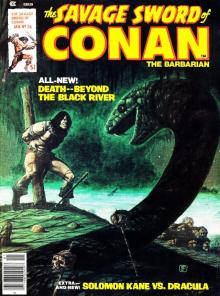 Beyond the Black River
Beyond the Black River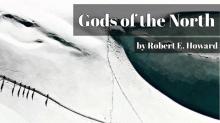 Gods of the North
Gods of the North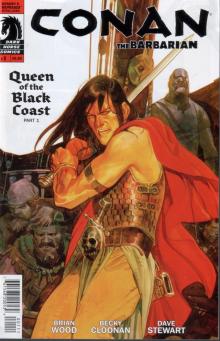 Queen of the Black Coast
Queen of the Black Coast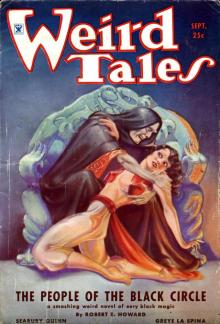 The People of the Black Circle
The People of the Black Circle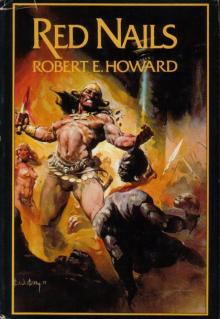 Red Nails
Red Nails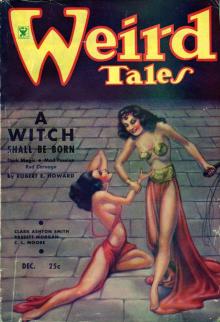 A Witch Shall Be Born
A Witch Shall Be Born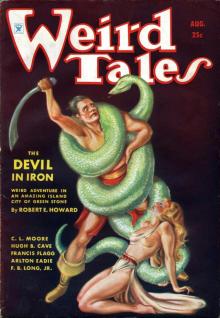 The Devil in Iron
The Devil in Iron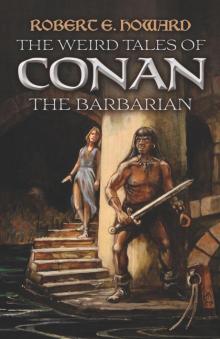 The Weird Tales of Conan the Barbarian
The Weird Tales of Conan the Barbarian The Bloody Crown of Conan
The Bloody Crown of Conan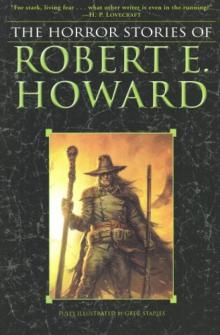 The Horror Stories of Robert E. Howard
The Horror Stories of Robert E. Howard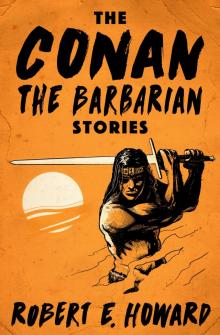 Conan the Conqueror
Conan the Conqueror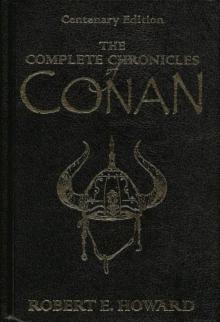 Conan the Barbarian
Conan the Barbarian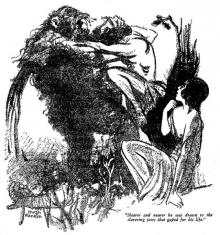 Shadows in the Moonlight
Shadows in the Moonlight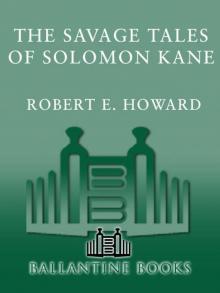 The Savage Tales of Solomon Kane
The Savage Tales of Solomon Kane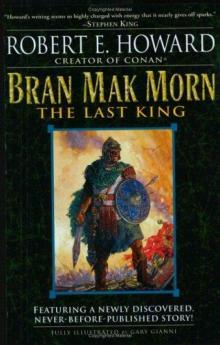 Bran Mak Morn: The Last King
Bran Mak Morn: The Last King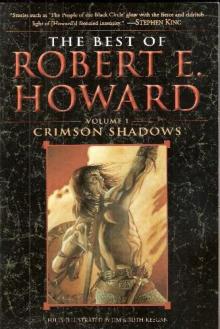 The Best of Robert E. Howard Volume One: Crimson Shadows
The Best of Robert E. Howard Volume One: Crimson Shadows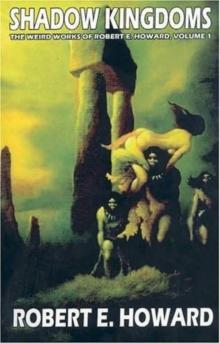 The Best of Robert E. Howard: Crimson Shadows (Volume 1)
The Best of Robert E. Howard: Crimson Shadows (Volume 1)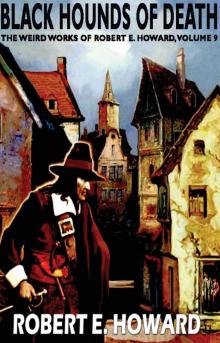 Black Hounds of Death
Black Hounds of Death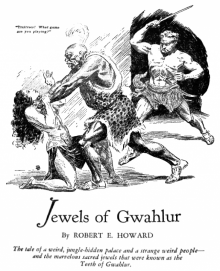 Jewels of Gwahlur
Jewels of Gwahlur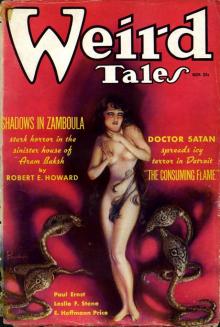 Shadows in Zamboula
Shadows in Zamboula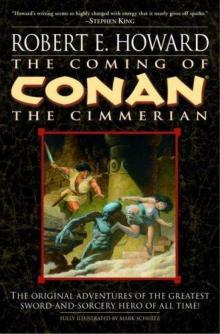 The Coming of Conan the Cimmerian
The Coming of Conan the Cimmerian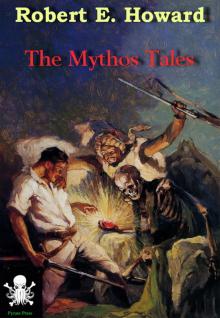 The Mythos Tales
The Mythos Tales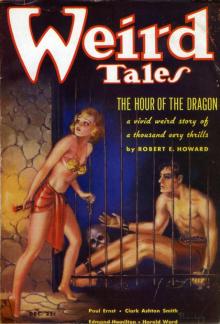 The Hour of the Dragon
The Hour of the Dragon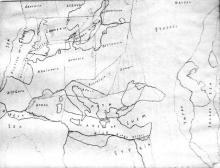 The Hyborian Age
The Hyborian Age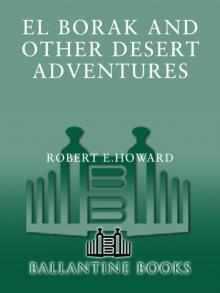 El Borak and Other Desert Adventures
El Borak and Other Desert Adventures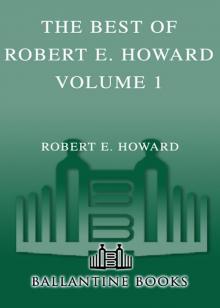 The Best of Robert E. Howard Volume 1 The Best of Robert E. Howard Volume 1
The Best of Robert E. Howard Volume 1 The Best of Robert E. Howard Volume 1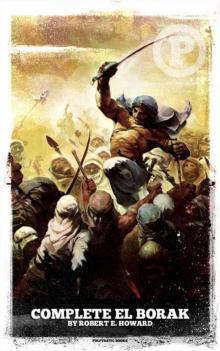 El Borak: The Complete Tales
El Borak: The Complete Tales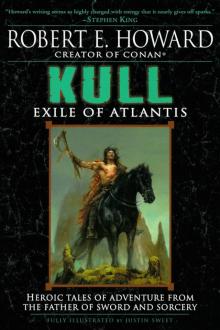 Kull: Exile of Atlantis
Kull: Exile of Atlantis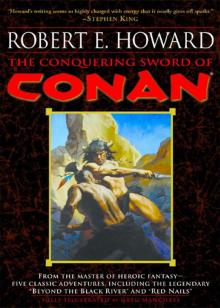 The Conquering Sword of Conan
The Conquering Sword of Conan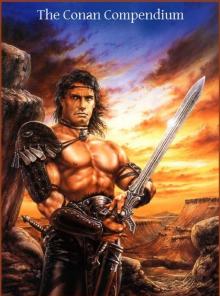 The Conan Compendium
The Conan Compendium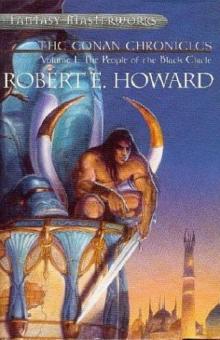 The Conan Chronicles: Volume 1: The People of the Black Circle
The Conan Chronicles: Volume 1: The People of the Black Circle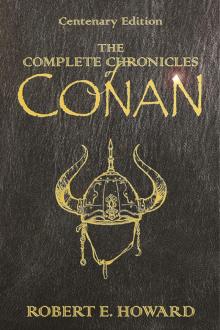 The Complete Chronicles of Conan: Centenary Edition
The Complete Chronicles of Conan: Centenary Edition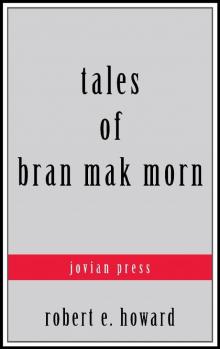 Tales of Bran Mak Morn (Serapis Classics)
Tales of Bran Mak Morn (Serapis Classics)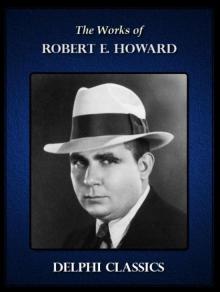 Delphi Works of Robert E. Howard (Illustrated) (Series Four)
Delphi Works of Robert E. Howard (Illustrated) (Series Four)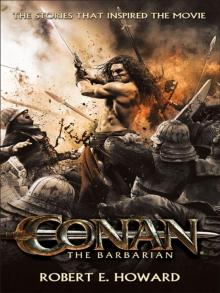 Conan the Barbarian: The Stories That Inspired the Movie
Conan the Barbarian: The Stories That Inspired the Movie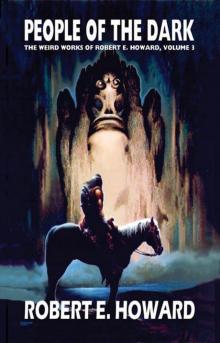 People of the Dark Robert Ervin Howard
People of the Dark Robert Ervin Howard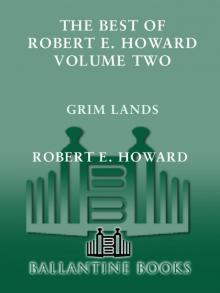 Grim Lands
Grim Lands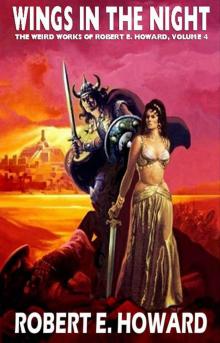 Wings in the Night
Wings in the Night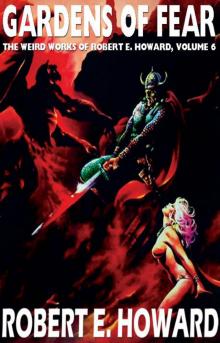 Gardens of Fear
Gardens of Fear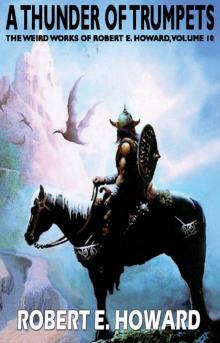 A Thunder of Trumpets
A Thunder of Trumpets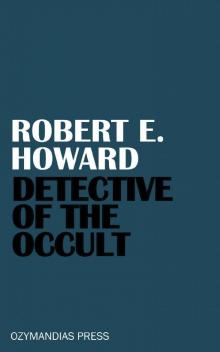 Detective of the Occult
Detective of the Occult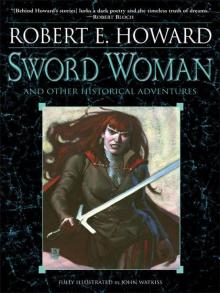 Sword Woman and Other Historical Adventures
Sword Woman and Other Historical Adventures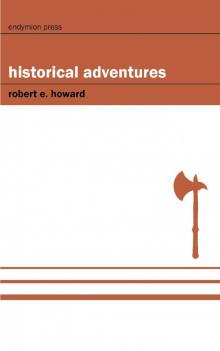 Historical Adventures
Historical Adventures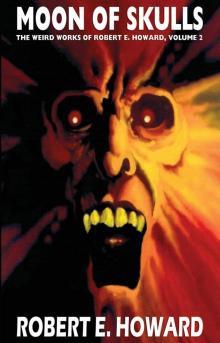 Moon of Skulls
Moon of Skulls The Robert E. Howard Omnibus: 97 Collected Stories
The Robert E. Howard Omnibus: 97 Collected Stories The Pirate Story Megapack: 25 Classic and Modern Tales
The Pirate Story Megapack: 25 Classic and Modern Tales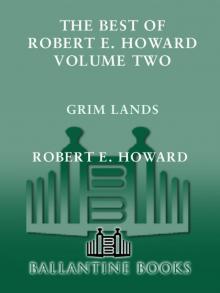 The Best of Robert E. Howard, Volume 2
The Best of Robert E. Howard, Volume 2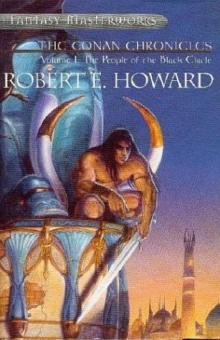 The Conan Chronicles, Vol. 1: The People of the Black Circle
The Conan Chronicles, Vol. 1: The People of the Black Circle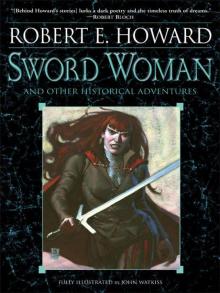 Sword Woman and Other Historical Adventures M
Sword Woman and Other Historical Adventures M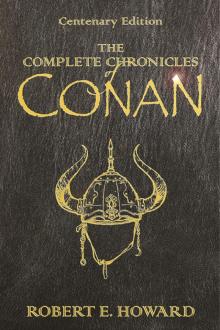 The Complete Chronicles of Conan
The Complete Chronicles of Conan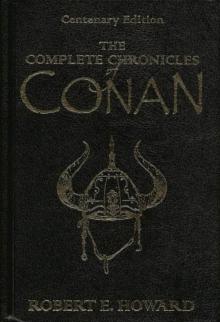 Conan the Barbarian: The Chronicles of Conan (collected short stories)
Conan the Barbarian: The Chronicles of Conan (collected short stories)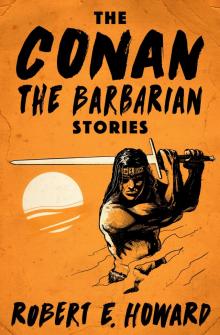 The Conan the Barbarian Stories
The Conan the Barbarian Stories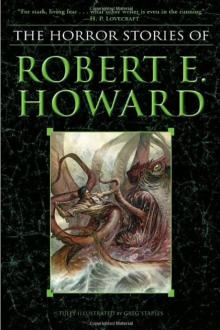 The Best Horror Stories of
The Best Horror Stories of Tigers Of The Sea cma-4
Tigers Of The Sea cma-4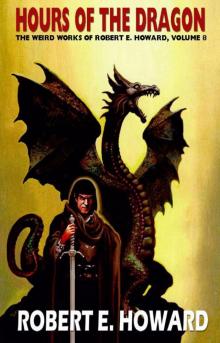 The Hours of the Dragon
The Hours of the Dragon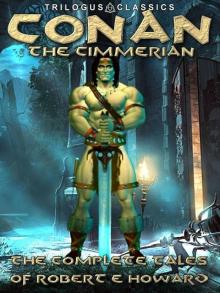 Conan the Cimmerian: The Complete Tales (Trilogus Classics)
Conan the Cimmerian: The Complete Tales (Trilogus Classics)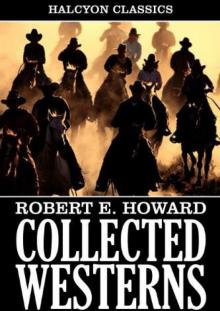 Collected Western Stories of Robert E. Howard (Unexpurgated Edition) (Halcyon Classics)
Collected Western Stories of Robert E. Howard (Unexpurgated Edition) (Halcyon Classics)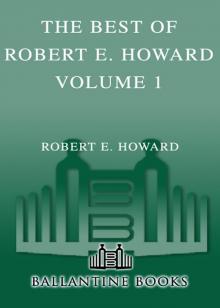 The Best of Robert E. Howard, Volume 1
The Best of Robert E. Howard, Volume 1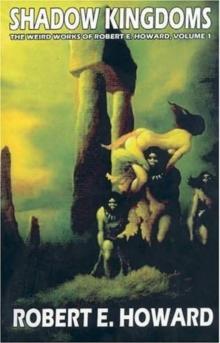 Shadow Kingdoms
Shadow Kingdoms